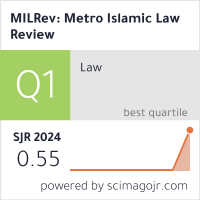Prohibition of Friday Prayer During COVID-19 Pandemic Period Againts Red Zone Areas in Islamic Law Perspective
DOI:
https://doi.org/10.32332/milrev.v1i1.6190Keywords:
Covid-19, Friday Prayer, Islamic Law, Red ZoneAbstract
During the Covid-19 pandemic, the Indonesian government prohibited people from performing Friday prayers in mosques based on the MUI fatwa. Based on these problems, this research wants to see whether some people obey the regulations or continue to perform Friday prayers because they think that Friday prayers are obligatory. Then we will look for the law on not performing Friday prayers because of a dangerous disease outbreak. There will be an equation of original law with maslahah murlah based on a review of Islamic legal philosophy. The law on Friday prayers is fardlu 'ain for men if the obligatory conditions are met. Friday prayer is the obligatory prayer of two rak'ahs which is carried out in congregation at Zuhr time, preceded by two sermons. The Covid-19 outbreak is not only a national problem in a country, but is also a global problem. In anticipating and reducing the number of corona virus sufferers in Indonesia, measures have been taken, including providing a policy of limiting activities outside the house. In Indonesia, the MUI urges Muslims to temporarily replace Friday prayers with midday prayers at home in the Covid 19 emergency situation to avoid a mudhorot, namely contracting an epidemic.










